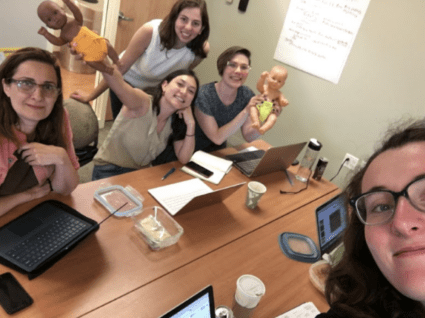Reflections from the Classroom: Diaper Heroes
We are Roxana Hashemian, Abby Kim, Kathryn Tsagronis, Katherine Lawler, and and Constance Fontanet. We are all BUSPH students from various backgrounds and with different skill sets, who all share an interest in global health.
During this Program Design class, we had the opportunity to work with Wide Horizons for Children, a Massachusetts-based NGO dedicated to the well-being and security of vulnerable and orphaned children worldwide. In 2013, Wide Horizons established Leku Hospital in the Southern Nations, Nationalities and People’s Region of Ethiopia. The hospital has quickly become a leading teaching and training hospital in the country. Leku Hospital has an 8 bed Neonatal Intensive Care Unit (NICU) which serves approximately 30 patients at a time.
 Currently, mothers of NICU patients tend to wrap their newborns in traditional scarves that quickly become saturated in urine and feces. The lack of waste management puts vulnerable neonates at risk of developing an array of adverse health outcomes including diarrhea, dysentery, typhoid, cholera, hepatitis A, and skin infection. The wet wrappings can also cause inadequate thermal protection, which puts newborns at an increased risk of hypothermia, severe upper respiratory infections, asphyxia and death.
Currently, mothers of NICU patients tend to wrap their newborns in traditional scarves that quickly become saturated in urine and feces. The lack of waste management puts vulnerable neonates at risk of developing an array of adverse health outcomes including diarrhea, dysentery, typhoid, cholera, hepatitis A, and skin infection. The wet wrappings can also cause inadequate thermal protection, which puts newborns at an increased risk of hypothermia, severe upper respiratory infections, asphyxia and death.
To address this problem, we worked in tandem with Wide Horizons to propose a pilot program to introduce reusable diapering to the Leku Hospital NICU. Our program would consist of the production of reusable cloth diapers, the implementation of their use in the NICU by nurses and families, and the cleaning of the diapers by laundry staff.
Diapering is not currently a common practice in Ethiopia and, accordingly, user-centered design will be utilized to ensure nurses’ and families’ knowledge, attitudes, and preferences on diapering practices are incorporated throughout the program. In addition to addressing preventable neonatal mortality, this program will also create a sustainable, community-based business model by employing community members to produce diapers and clean them.
Working on this project together has been a challenging and enriching experience. On Day One, it seemed unimaginable that we could put together a strong proposal and present our project in front of a panel of reviewers. We did a lot of research, spent a lot of time debating our ideas and ironing out small details, and finally our proposal seemed to come together after two weeks.
We believe that we are putting forth a strong and sound proposal, which could really impact neonatal mortality at the Leku Hospital NICU. Establishing a successful diaper program in the Leku Hospital NICU can potentially lay the groundwork for future expansion to benefit the larger population, and we cannot wait to see the project be implemented!